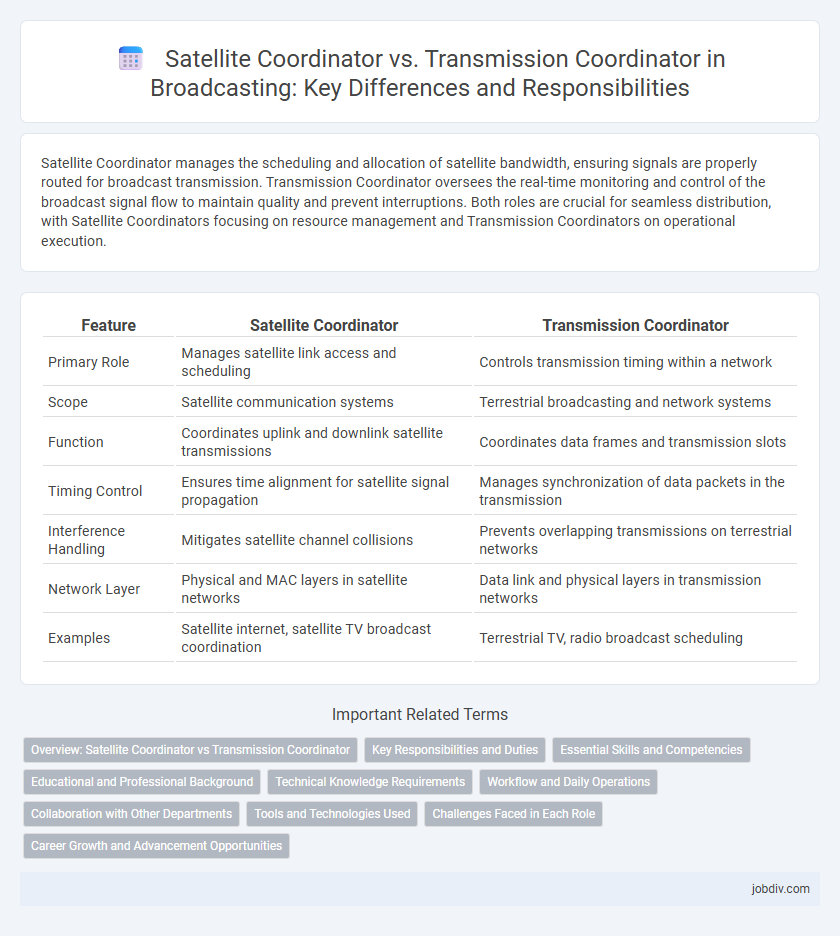Satellite Coordinator manages the scheduling and allocation of satellite bandwidth, ensuring signals are properly routed for broadcast transmission. Transmission Coordinator oversees the real-time monitoring and control of the broadcast signal flow to maintain quality and prevent interruptions. Both roles are crucial for seamless distribution, with Satellite Coordinators focusing on resource management and Transmission Coordinators on operational execution.
Table of Comparison
| Feature | Satellite Coordinator | Transmission Coordinator |
|---|---|---|
| Primary Role | Manages satellite link access and scheduling | Controls transmission timing within a network |
| Scope | Satellite communication systems | Terrestrial broadcasting and network systems |
| Function | Coordinates uplink and downlink satellite transmissions | Coordinates data frames and transmission slots |
| Timing Control | Ensures time alignment for satellite signal propagation | Manages synchronization of data packets in the transmission |
| Interference Handling | Mitigates satellite channel collisions | Prevents overlapping transmissions on terrestrial networks |
| Network Layer | Physical and MAC layers in satellite networks | Data link and physical layers in transmission networks |
| Examples | Satellite internet, satellite TV broadcast coordination | Terrestrial TV, radio broadcast scheduling |
Overview: Satellite Coordinator vs Transmission Coordinator
Satellite Coordinators manage the allocation and scheduling of satellite transponder resources to ensure optimal signal distribution and minimize interference in broadcasting networks. Transmission Coordinators oversee the technical quality and timing of broadcast signals from encoding to transmission, maintaining seamless content delivery across various platforms. Both roles are critical for maintaining broadcast integrity but focus on distinct aspects: Satellite Coordinators handle space-based signal logistics, while Transmission Coordinators manage terrestrial and network transmission quality.
Key Responsibilities and Duties
Satellite Coordinators manage the scheduling, signal quality, and uplink coordination of satellite broadcasts, ensuring seamless transmission to receiving stations globally. Transmission Coordinators oversee the overall broadcast chain, handling signal routing, timing, and quality control from studio to transmission, including satellite, terrestrial, or cable platforms. Both roles require collaboration to maintain uninterrupted broadcast delivery, with Satellite Coordinators focusing on satellite link integrity and Transmission Coordinators managing end-to-end signal flow.
Essential Skills and Competencies
Satellite Coordinators must excel in orbital mechanics, frequency allocation, and satellite link budgeting to ensure seamless signal transmission and interference avoidance. Transmission Coordinators require strong expertise in RF modulation, signal encoding, and broadcast chain management to maintain consistent content delivery across multiple platforms. Both roles demand proficiency in troubleshooting, communication, and regulatory compliance to optimize broadcast quality and operational efficiency.
Educational and Professional Background
Satellite Coordinators typically possess a background in telecommunications engineering or satellite communications, often holding degrees such as a Bachelor's or Master's in Electrical Engineering, Broadcast Engineering, or related fields. Transmission Coordinators usually have education focused on broadcast technology and media management, with qualifications including associate or bachelor's degrees in Broadcast Media Production or Communications, combined with specialized training in transmission systems. Both roles require professional experience in broadcast operations, but Satellite Coordinators emphasize satellite signal management while Transmission Coordinators focus on the overall transmission infrastructure and scheduling.
Technical Knowledge Requirements
The Satellite Coordinator must possess specialized knowledge in satellite communication protocols, orbital mechanics, and spectrum management to ensure efficient allocation and interference-free signal transmission. The Transmission Coordinator requires expertise in terrestrial broadcast systems, signal encoding, modulation techniques, and network infrastructure to optimize content delivery and maintain signal integrity. Both roles demand proficiency in regulatory standards and real-time troubleshooting to uphold broadcast quality and compliance.
Workflow and Daily Operations
Satellite Coordinators oversee the scheduling and allocation of satellite transponder time, ensuring optimal bandwidth usage and coordination with satellite providers for uplink and downlink operations. Transmission Coordinators manage the real-time monitoring and control of broadcast signals, focusing on signal integrity, switching, and transmission quality during live and recorded programming. Their workflows intersect in coordinating feed timings and ensuring seamless delivery, but Satellite Coordinators emphasize planning and resource allocation while Transmission Coordinators handle operational continuity and technical troubleshooting.
Collaboration with Other Departments
Satellite Coordinators ensure seamless satellite link integrity by collaborating closely with Engineering and Network Operations teams to optimize signal transmission and resolve uplink issues promptly. Transmission Coordinators synchronize content delivery schedules, working with Programming and Master Control departments to guarantee accurate broadcast timing and adherence to compliance standards. Effective collaboration between Satellite and Transmission Coordinators enhances overall broadcast reliability and ensures uninterrupted viewer experience.
Tools and Technologies Used
Satellite Coordinators employ satellite communication tools such as uplink transmitters, downlink receivers, and signal monitoring systems to manage frequency allocation and ensure optimal satellite signal integrity. Transmission Coordinators utilize broadcast automation software, signal encoders, and network management systems to control the timely delivery of audio and video content across terrestrial and IP-based transmission platforms. Both roles rely heavily on spectrum analyzers and real-time monitoring technologies to maintain seamless broadcast quality and prevent signal interference.
Challenges Faced in Each Role
Satellite Coordinators manage frequency coordination and orbital slot assignments, facing challenges such as signal interference, regulatory compliance across multiple countries, and maintaining optimal satellite uptime. Transmission Coordinators handle the integrity of broadcast signals, contending with issues like synchronization errors, network latency, and real-time troubleshooting during live broadcasts. Both roles require precise technical expertise to ensure seamless content delivery despite complex operational environments.
Career Growth and Advancement Opportunities
Satellite Coordinators specialize in managing satellite signal allocation and troubleshooting, making them vital for global broadcast coverage and offering strong advancement into satellite network architecture or systems engineering roles. Transmission Coordinators focus on overseeing broadcast signal flow, scheduling, and technical quality control, providing a clear pathway toward senior technical management or broadcast operations leadership. Career growth in both fields benefits from technical certifications and experience with industry-standard broadcasting technologies, but Satellite Coordinators often have broader opportunities in international broadcasting and telecommunications sectors.
Satellite Coordinator vs Transmission Coordinator Infographic

 jobdiv.com
jobdiv.com